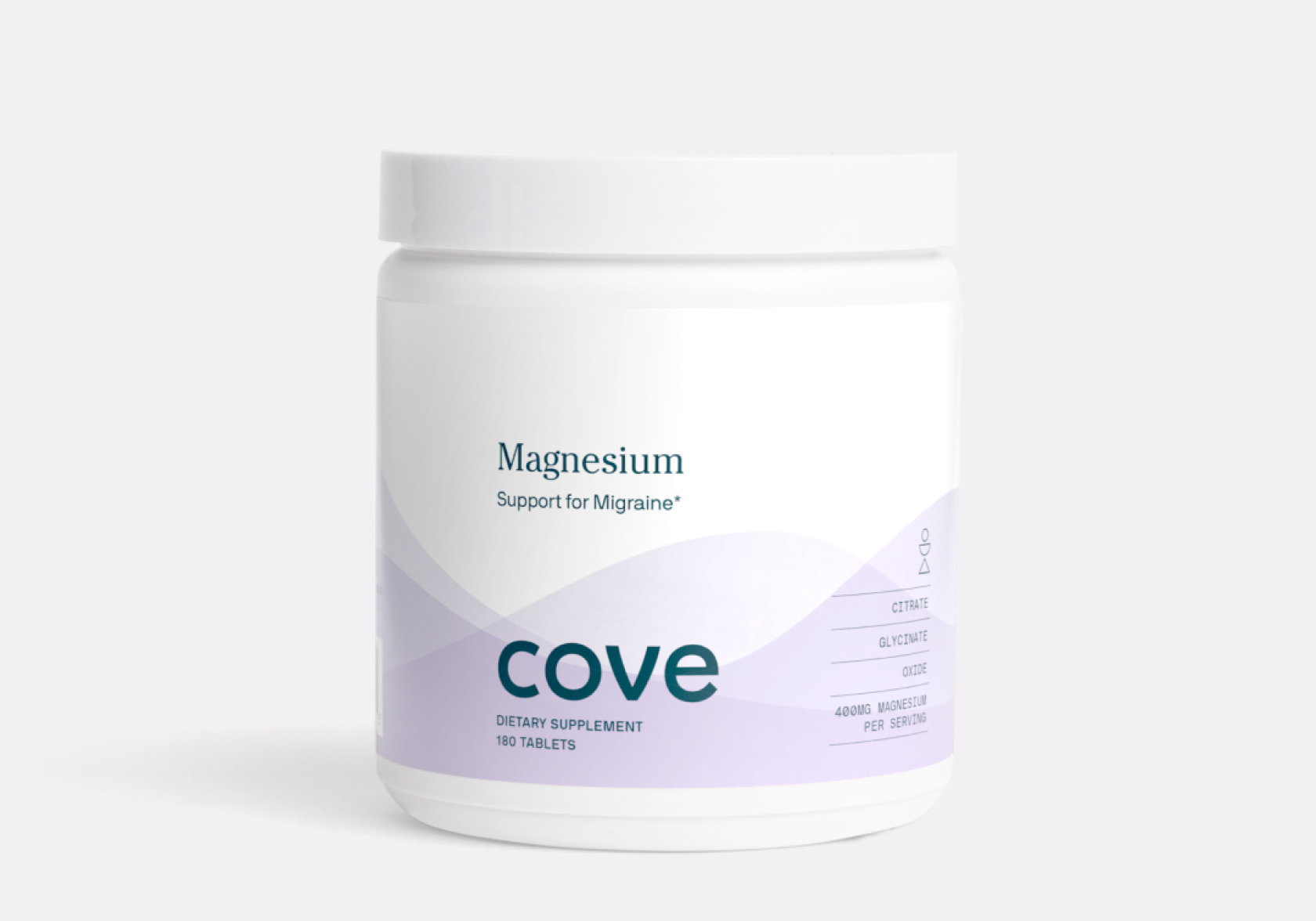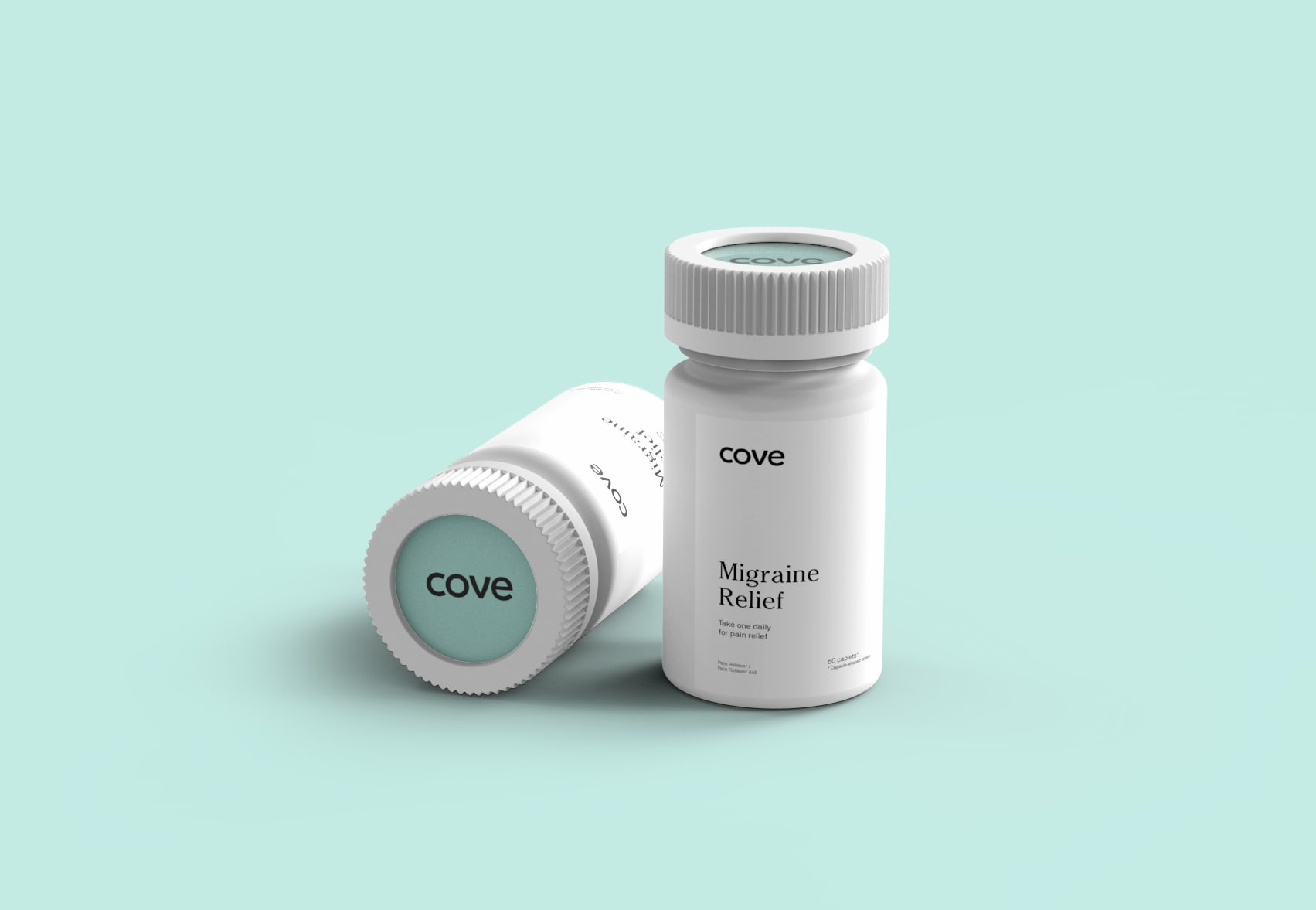You may feel like you’ve been hearing a lot about how vitamins and supplements can help prevent migraine attacks or even reduce the pain that comes along with them.
But which claims are real and which are just bogus?
We did the research for you and found out that magnesium is one of the few nutrients that can help cut down migraine frequency.
Here’s everything you need to know about this natural migraine treatment.
What is magnesium?
Let’s start with the basics. Magnesium is a mineral that you need to stay healthy, just like calcium or iron. Specifically, magnesium helps your body do things like regulate muscle and nerve function, keep your blood pressure normal, and make protein, bone, and DNA.
It’s found in many foods, as well as in supplement form.
How do you know if you’re getting enough magnesium?
The amount of magnesium a person should be getting depends on age and sex, but the average recommended amount is around 310-320 mg for women and 400-420 mg per day for men. Most people in the U.S. don’t get enough magnesium from their diets, but older men and teenage girls are especially likely to have low magnesium levels.
How can you tell if you’re not getting enough? Unless your magnesium deficiency is severe, you probably won’t be able to tell. Even blood tests reveal less than 2% of the full amount of magnesium in your body, because most of it is stored in bones and cells.
Symptoms of magnesium deficiency include: loss of appetite, fatigue, nausea, and weakness, which are all fairly easy to chalk up to a different cause. Migraine sufferers are especially likely to be lacking in magnesium.
Can magnesium help prevent migraine attacks?
According to multiple scientific studies, the American Headache Society, and the American Academy of Neurology, the answer is yes. Not every clinical trial has shown magnesium to be effective at preventing migraine headaches, but there’s enough evidence that it helps that it’s a good option to consider.
How can it help? Experts think magnesium may help prevent the wave of brain signaling, called a cortical spreading depression, that is thought to cause migraine. It can also reduce pain during an attack by blocking pain-transmitting chemicals in the brain.
Research suggests that it’s especially helpful for people who have migraine with aura or menstrual migraine. Scientists believe it may help prevent aura by stopping your brain from producing the signals that cause it, but they aren’t quite sure why it’s so effective against menstrual migraine.
What other conditions can magnesium help with?
Magnesium isn’t just beneficial for migraine sufferers. Ihis powerful mineral may also help people with:
- high blood pressure or heart disease
- osteoporosis
- type 2 diabetes
What foods are good sources of magnesium?
By now you might be thinking that it's a good idea to get more magnesium in your diet, so you may be wondering what you should eat to make that happen. Foods that are rich in magnesium include:
- dairy products like milk and yogurt
- fortified breakfast cereals and other foods that have nutrients added to them
- green, leafy vegetables like spinach
- legumes, nuts, and seeds
- whole grains
How else can I get magnesium?
Ok, you probably should eat more spinach, but that doesn’t mean you want to eat it every night. So how else can you make sure you’re getting plenty of magnesium?
The answer, as you may’ve guessed, is supplements. Magnesium is included in many multivitamins and other dietary supplements. Even when the whole purpose of the supplement is to give you more magnesium, it’s usually still combined with other nutrients because it’s easier for your body to absorb it that way. The most easily-absorbed supplements combine magnesium with aspartate, chloride, citrate, glycinate, or lactate. If you’re taking magnesium for migraine prevention, you’ll typically want the dosage to be between 400 and 500 mg per day.
What forms do magnesium supplements come in?
Magnesium supplements come in many forms, including tablets (sometimes chewable), capsules, powders, oil sprays, and even Epsom salt, which is supposed to be added to your bathwater. Capsules and powders are usually effective, but be wary of topical products like bath salts, sprays, and lotions. Your skin needs too much time to absorb a mineral like magnesium for topical methods to work. One small Israeli study showed that applying a magnesium sulfate lotion had no impact on participants’ magnesium levels.
What form of magnesium supplement does Cove offer?
Cove offers 400 mg magnesium citrate, glycinate and oxide tablets. After working with leading headache specialists, we chose this formulation because it's easily absorbed, calming, and most likely to be effective. You can get magnesium supplements delivered to your door with Cove.
You can also try taking magnesium in combination with other vitamins and minerals that can have a positive effect on migraine. Cove offers two of these:
- Beam is a first-of-its-kind migraine supplement that includes clinically-effective doses of magnesium, riboflavin (a.k.a. vitamin B2) and Coenzyme Q10, all of which have been shown in studies to reduce the frequency of migraine attacks.
- Oasis is a hydration supplement that helps your body replenish electrolytes you naturally lose throughout the day. It contains a clinically-effective dose of magnesium as well as sodium, potassium, calcium, and vitamins C, B6, and B12.
What should I be cautious of?
Magnesium supplements are relatively safe (even for pregnant women, so long as the dose isn’t higher than 400 mg), but that doesn’t mean they’re for everyone. People with reduced kidney function or certain neurological disorders (such as myasthenia gravis) should not take magnesium without first discussing it with their medical provider.
In addition, magnesium supplements can interfere with your body’s ability to absorb some medications, so talk to your medical provider before starting if you’re taking any of these medications:
- antibiotics
- bisphosphonates, which are used to treat osteoporosis
- diuretics
- prescription medications for acid reflux or peptic ulcers
Are there any possible side effects?
Typically, if people get too much magnesium, their kidneys will just get rid of the excess in their urine. Still, you should not take magnesium supplements more often than indicated on the packaging unless directed by your medical provider.
Taking too much magnesium can cause stomach cramps, diarrhea, and nausea, and extremely high intake can cause irregular heartbeat and even cardiac arrest. That said, it’s very difficult for someone to accidentally take enough magnesium to induce the most severe side effects.
How does magnesium compare to prescription preventive medications?
Prescription medications come with side effects, and everyone’s different when it comes to which side effects aren’t too bad and which are just too much. One of the advantages of magnesium is that it doesn’t come with as many side effects. But the flipside of that is that it also may not be as effective.
Can you take magnesium with migraine medications?
Magnesium is usually safe to take with preventive or acute migraine medications, but it’s best to talk to your medical provider if you have any questions.
What if I take magnesium and it doesn't work?
The benefits of supplements can take a while to show up, so try to wait three or four months before giving up on magnesium. (Having trouble telling if it's helping? Try tracking your migraine.)
If magnesium's still not working for you after a few months, you might want to switch to a different supplement with a track record of reducing migraine frequency, like riboflavin (a.k.a. vitamin B2) or Coenzyme Q10 (a.k.a. CoQ10), or a preventive medication.
What other supplements does Cove offer?
Cove also offers Super B, which combines a clinically-effective dose of riboflavin with three other B-vitamins (B6, B12, and folate or B9) that work together to help your body convert food into fuel, which can also mean more energy and healthier brain and blood cells for you.
And since essential oils can relieve migraine symptoms for some sufferers, Cove has an Essential Oil Roll-On stick for fast relief.
So there you have it: everything you need to know about magnesium. That may have been a lot of information, but the main takeaway is that magnesium is a relatively safe way to reduce the frequency of your migraine attacks, either on its own or in addition to preventive medications.
Cove offers a variety of supplements formulated just for migraine sufferers, including magnesium, which you can purchase without a prescription at our Wellness Shop.
The information provided in this article is not a substitute for professional medical advice, diagnosis, or treatment. You should not rely upon the content provided in this article for specific medical advice. If you have any questions or concerns, please talk to your medical provider.
These statements have not been evaluated by the FDA. This product is not intended to diagnose, treat, cure, or prevent any disease.


